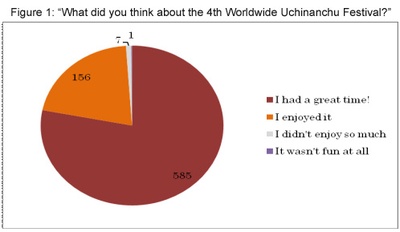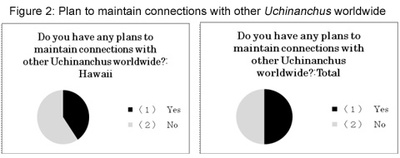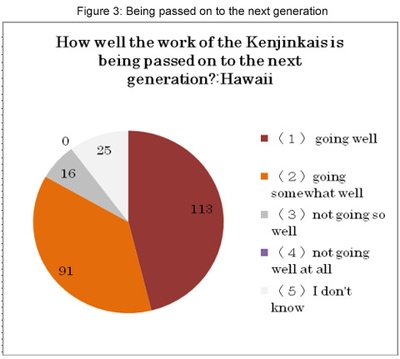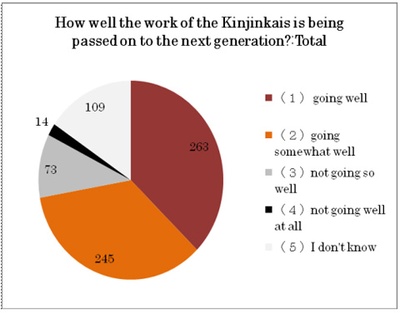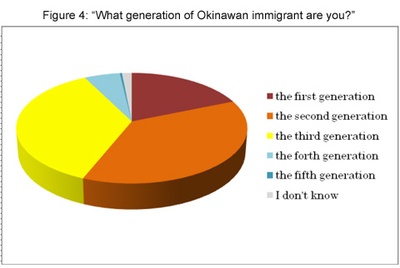Introduction
In this report, I first would like to discuss the final result of the survey we conducted with the participants of the 4th Worldwide Uchinanchu Festival. Firstly, I discuss how they evaluated the festival. Secondly, I differentiated between participants from Hawaii and women participants as important categories among participants. With regard to the Okinawan network of Hawaii, I introduce the concept of “self-sufficient network” as a hypothesis. Then I will write on the prospects of a worldwide Okinawan network, reflect on the comments of the survey. Finally I will note the basic attributes of subjects who cooperated to answer the questions at the festival.
I. The Participation in the Worldwide Uchinanchu Festival
The opinions about participation in the 4th Worldwide Uchinanchu Festival were: “I had a great time!” (78.1 percent), and “I enjoyed it” (20.8 percent), which shows the degree of satisfaction was high.
In terms of outcomes, the percentage of people who said “Uchinanchu Festival deepened my understanding of Okinawan tradition, culture and local atmosphere” was the highest at 74.4 percent. “The realization of my identity as Okinawan,” “A deepened understanding of the history of immigration,” “Strengthened connections among Uchinanchus worldwide” combined for 60 percent of the responses. Meanwhile, low responses included “The promotion of business exchange” (6.7 percent) and “An opportunity to introduce my country/region’s culture to residents of Okinawa” (26.1 percent). Subjects felt the success of the festival in regard to the actual goal of the festival, which was confirmation of identity. Meanwhile, in terms of exchange, there are remaining challenges.
II. The Succession to the Future Generation and Exchanges to Come
With regard to being passed on to the next generation within the Okinawan association (Kenjinkai) in which the respondents are affiliated, 72.2 percent of the respondents gave positive feedback, including the answer, “somewhat well.” In terms of specific plans for further exchanges with Uchinanchus worldwide, “Yes” and “No” came out 50/50 percent.
III. Characteristics of Participants from the State of Hawaii
In terms of being passed on to the next generation within the Okinawan association (Kenjinkai) within the affiliated Okinawan association, the percentage of people who said “It is (somewhat) going well,” was relatively high from the participants from Hawaii. With regard to Japanese proficiency, participants from Hawaii were relatively low. As far as those who can speak Japanese, including everyday conversational level, in Hawaii the percentage was 30.9 percent, 44.1 percent in other states of U.S. and 45 percent in participants as a whole.
What is interesting is the coming prospect. With regards to future plans to maintain connections with other Uchinanchu worldwide, as a whole, “Yes” was 50.1 percent and “No” was 49.9 percent, while “Yes” was 40.5 percent and “No” was 59.5 percent from Hawaii. “No” exceeded “Yes” by 19 percent in Hawaii.
In regards to topics of exchanges, the responses of the participants from Hawaii did not show high expectations for business or training-and-development with other Uchinanchu from overseas.
A hypothesis that can be derived from these findings is, “The self-sufficiency of the Uchina network in Hawaii.” It can be assumed that, whether it is good or bad, the network of Okinawan people in Hawaii, to a certain degree has reached a mature self-sufficiency.
IV. Women Participants
Women made up 60 percent of this survey’s respondents. There were many white-collar workers, especially women who work as career professionals. Moreover the women who had the energy to come to Okinawa, after retiring from work and raising children, were an important structural element of the festival participants.
In terms of the degree of satisfaction and the festival’s general outcome, there were hardly any differences based on gender. For plans regarding further exchanges with Uchinanchu from overseas, women who responded “No” (51 percent) exceeded “Yes” (49 percent) by a small margin. On the contrary, men who responded “Yes” (53.1 percent) exceeded “No”(47.1 percent) by a small margin. In thinking of a future global Uchina network, it seems important to increase women’s participation and utilize their energy.
V. Prospects and Challenges for a Further Global Okinawan Network
In the section for free comments, many expressed their gratitude that this festival was held, deep pride, a sense of belonging, and a sense of being an Uchinanchu, and finally there were eager voices wanting this festival to continue.
On the other hand, within the level of practical exchange there are remaining challenges. Okinawa Prefecture, the sponsor of the festival, should pay attention to the voices of the participants who say they want more exchanges and communications with the local Okinawan people. In addition, to provide an opportunity for young people for exchange and mutual learning are extremely important for training-and-developing for the succession of the future generation.
VI. Basic Attributes of Subject of Study
The biggest age-group of fifteen age groups of the respondents who participated in the Fourth Worldwide Uchinanchu Festival was between ages of 60-64. Respondents between the ages 55-74 comprised 52.7 percent of the entire group. According to gender, male participants were less than 40 percent and female participants were more than 60 percent. By generation, the second generations was 37.4 percent and the third generation was 36.3 percent, where as the first generation was 18.8 percent.
In terms of the current place of residence, 63.8 percent of the participants were U.S. residents with 56 percent coming from Hawaii. In terms of Japanese language proficiency, “I cannot understand/speak at all. Or I know only a few words” made up 39.1% of the participants.
VII. Conclusion: Challenges to Come
There were requests on contents of the Festival such as to decrease the ratio of the ceremonial aspects and to increase exchanges amongst the participants. Also to increase opportunities where one can enjoy Okinawan cultures like Eisa. From the section for free comments, there were requests on practical exchanges for the participants like being able to converse or to build a relationship that would lead to communication after the Festival.
It can be assumed that the ratio of participants who were born overseas will continue to increase in the future. It raises the question of exchanges and network over what would the participants do in Okinawa, and what significance would the Festival have for the participants hereafter.
There is a need for Okinawa prefecture, the sponsor of the Festival, to pay attention to the voices of the participants who say they want more exchanges and communications with the local citizens of Okinawa prefecture. In addition, to provide a place for young people to meet and giving chances for mutual learning is extremely important for training-and-developing and for the succession of the future generation.
With regard to that, it is not the sole responsibility of the sponsor, but there is a possibility for educational and research institutes in Okinawa to take part in the matter as well. It is significant to both the people of Okinawan descent overseas and those who live in Okinawa to continue to question the young people and those who live in Okinawa on the meaning of the worldwide Uchinanchu and the broad range of its network.
Needless to say the worldwide Uchinanchu Festival is an extraordinary festival. There is a need to validate evidence on the Festival and see how it is connected to the Okinawan people and if it melts into their everyday life, and does it have or have not any effect on them.
Firstly on a personal level, for example, are those who thought they wanted to study Japanese language actually studying it? Secondly, on the level of Okinawan association, how are they looking back on the achievements of the Festival? Can we see positive impact from the Festival on developing the next generation? Thirdly, on the level of cross-border network, are they actually keeping in touch, and deepening their relationship worldwide? In addition, for many Okinawan people who did not/could not come to the Festival, what does “global Uchina network” mean to them?
The magnificent Festival is over. It is the time to examine the impact and discuss it for the possibility for further networking.
© 2008 Naomi Noiri


